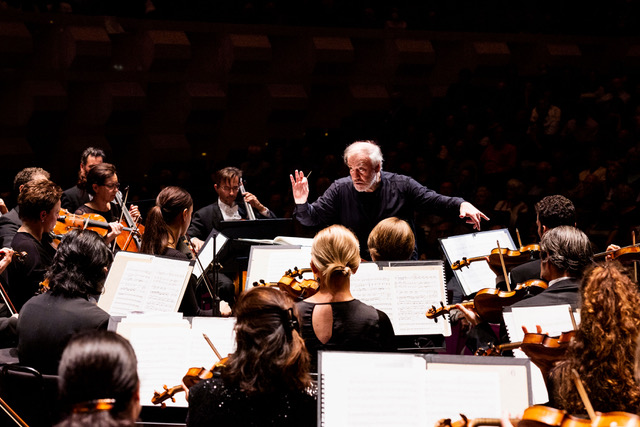Willem Jan Keizer
Rotterdam – Almost miraculously, with the start of the concert season this month, the relieved measurements around the covid-19 crisis made it possible to organise a Rotterdam Philharmonic Gergiev Festival as it should be. A large concerthall – 2000 plus seats – filled with audience for 75 per cent and a completely normal stage set up. It felt unreal for a large part of that audience, people still were cautious to keep their distance despite the fact that the rule of staying 1.5 metres apart from one another was cancelled earlier this week. But the thundering, ongoing applause for maestro Valery Gergiev and the Lord Mayor of Rotterdam, the honourable Ahmed Aboutaleb entering on stage told the whole story.
The announcement of mr. Aboutaleb that performances like this evening were possible again caused an explosion of relief even before one single note was played. Mr. Aboutaleb lowered the expectations by warning that the virus that had closed down whole societies is still out there, pushing us to remain careful.
This year’s festival, after a year of silence, celebrates the twentyfifth edition since 1996 and carries the music from St.Petersburg as a main theme. Nothing very new here, many a Gergiev Festival revolves more or less around the home town of the conductor who’s magic started in the Netherlands, first with a guest-direction at the Radio Philharmonic Orchestra, soon to follow as a principal-guest and principal conductor of the Rotterdam Philharmonic. Within a few years only his fame rose to stardom because of his relentless effort to keep the Mariinski Theatre in his home town alive and his non-stop concert practice world wide. It brought the Rotterdam orchestra international acclaim and recognition.
Therefore, the music of Piotr Il’yich Tchaikovsky and Dmitri Shostakovich take up a central role in the festival’s program. The opening of the first concert evening though, was for a brand new work written by Alfred Momotenky-Levitsky (1970). Its title, Madame en Noir, refers to card play in St. Petersburg and therefore to composers like indeed Tchaikovsky and Shostakovich who wrote operas on this theme (Queen of Spades; The Gambler). To write an overture is mostly an ungrateful commission, also in this case. The less than ten-minute overture was written in a modest-modern idiom, the like of what we hear so often. Tutti outbursts, chamber music style withdrawals ending up in again an outburst of the full orchestra – we’ve heard so much of this. Encouraging however is that this will be part of a larger, still to compose work so that this overture at least won’t vanish directly to the bottom of the pile of scores-to-be-performed.
The performance of Tchaikovsky’s Suite no. 1 from the ballet Nutcracker was like snow in June. This is the ultimate Christmas music, especially according to the Anglo-American version of Christmas. Everything is strange about this ballet music however. First of all the title: Suite no. 1, op. 71a. This suggests there would be a second suite as well. Which is not the case. The score of the full ballet in the 19th century print shows us something weird. The work splits into two equal parts, the first half, composed as one part without a break, and the part after the interlude which is indeed an old fashioned suite. But also written in two different handwritings and with different lay-out. This suggests there’s still something else behind this work than a composer struggling with a libretto that obviously makes little sense. Even the nowadays choreographers have their problems with staging this ballet and make a complete, understandable unity.
The performance by the sharply playing Rotterdam body was not totally perfect. Rhythmically it had its problems with strings staying behind sometimes (Trepak; Russian Dance) from the wind and percussion sections. This problem did not occur any more in the razor-sharp performance of Shostakovitch’s First Symphony, written in 1924. This exam piece sounds like a fully developed symphony with all signatures that the composer elaborated over the years, already in place. Well performed under the baton, erh, toothpick of Valery Gergiev. His well known gestures, his swiveling vingers were equally well understood by the orchestra that showed their tradition of imminent response to the conductor. Not every conductor feels confident with this reactiveness but the combination with Gergiev has proven over the years to be a golden one, worth the international acclaim.
16 September 2021: Concerthall de Doelen, Rotterdam: Rotterdam Philharmonic Gergiev Festival. Opening concert 16 September 2021. Rotterdam Philharmonic Orchestra, Valery Gergiev-conductor. Momotenko-Levitsky, Tchaikovsky, Shostakovich.
©willemjankeizer2021 nothing may be re-publised or used otherwise without prior consent
photo © Guido Pijpers 2021. Valery Gergiev and his toothpick baton
www.rotterdamsphilharmonisch.nl/

